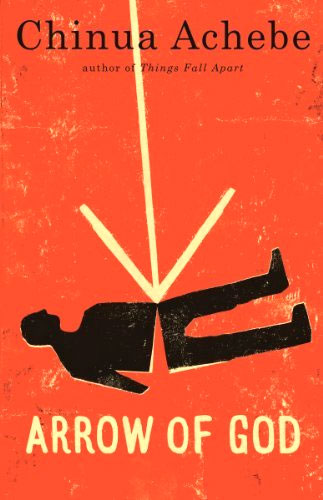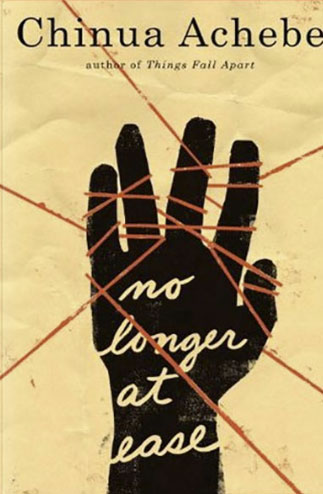Vivienne’s Diary – 30.06.20

Dear members of the IoU bookclub,
U R activists + readers. Chinua Achebe’s books are as powerful + original now as when they were first written. We’re looking back through the prism of what’s going on today. I was thinking about black lives matter, it’s a terrible thing to deprive people of the power they were born with.
Things Fall Apart by Chinua Achebe
This is the first book of what became a trilogy, it caused a sensation. It’s a masterpiece, it’s Olympian, meaning that Achebe takes his seat amongst the Gods’ of literature. It’s a story that says everything about human nature + who we are. It’s only when things fall apart that character is revealed. The trilogy is about the tribes of Nigeria + the incursion of the whites. In this first book no-one has seen a white person yet, it must be some time around 1900.
Okonkwo is a strongman, a wrestling champion. The three stories are about power. I think power is the most fundamental need in a human being + that power results in status. Power is given to people according to their talent + a good life is one in which people achieve their potential. I think this is terribly important in the world we live in now regarding Black Lives Matter.
Wealth is land + the tribe’s relation to land is so basic, nobody owned land, they were custodians of land – the social structure of the tribe depends on the ability to produce yams. Okonkwo’s father was weak in the eyes of the tribe, he lived completely on debt, without status, he had no titles + he passed on no inheritance to Okonkwo. There was no land ownership, he cleared his own patch of land + he had to work in exchange for seed yams, + he built his own barn. He began with nothing + his discipline + drive made him a hero of the tribe – he had three wives + his family was the badge of his status. His great fear was never to show weakness + because of this half-way into the story he made a terrible decision because the tribal protocol was one of sacrifice + brutal karma + evil powers.
My favourite character was Okonkwo’s favourite wife, Ekwefi – she’s wonderful, she fell in love with him when he won the wrestling match but she wasn’t able to marry him because he had no wealth – no yams. Money was in the form of cowry shells which I consider to be just as useful a standard as gold counters. The tribal customs are fascinating + exotic + that’s what makes us wake up to how crazy our own customs are. What I love is the formality of tribal relationship where politeness begins with wise maxims + observation.
The wives educate their children by telling them magical stories + I know that to teach something is to learn yourself. A highlight of these relationships is that between Akwefi + her only daughter, Ezinma. Conflict between the hardly arrived whites + the tribe happens at the very end of the book. The white men introduce the idea of ownership of land, the tribal people were custodians.

In Arrow of God, Ezeulu, is a shaman, + again the story is about power. This book is a generation later when the white people have arrived. They are very present in the book + it’s a complete conflict of ethics + morality.
Ezeulu is tall, handsome + of strong character. He is looking for the new moon + then he will be able to give the dates for planting of the yams, festivals + market days. He doesn’t see very well, he’s not so young anymore, he asks himself: what is my power? The God has power but who am I. There is a sentence which you might miss, ‘he came to the edge of knowing.’ That’s all it ever says about it, he doesn’t face the truth that he is the God, there is no Ulu.
Ezeulu inherited the priesthood, his name means ‘Priest of Ulu’, the 9 villages of Umu each with a God, but the tribes wanted to invent a God that was more powerful than all of them, they chose the tribe of Ezeulu + his ancestors because it was the weakest, + they did not want any of the tribes in themselves to become more powerful than the others. The tribes prepared a fetish, split it, half in the river belonging to the tribes, + half of it in the ground, there from sprang a market which was the hub of all the tribes. I realise that our God is also our creation. There’s nothing strange about this because we created God too.
All three books seem to be written in a different style but always minimal: the story’s in the detail (universal in the particular). Ezeulu is the second generation + the white man is more present. The white governor controls the administration + the law court. He is such a good man, throughout the trilogy, we are comparing the customs of the two cultures. All the characters are icons, so true to life. This book is probably my favourite because of the protocol of the tribe: it’s rude to come straight to the point, meetings begin with wise sayings, the preliminaries display the care + precision of mating birds.
The plot develops according to the characters of everyone concerned in this conflict between the two extremes of behaviour, black + white, + ends because Ezeulu makes a mistake as to what is required of him by his God. Other books of Achebe, deal with the ancestors of these three generations, it is incredible how he knows so much of their daily code of behaviour + how he quotes their aphorisms as applicable to every speech they make.

In the third-generation novel No Longer At Ease, Obi Okonkwo, is in jail arrested for corruption, he doesn’t care but he’s sorry for his sponsors. The story is told as a flashback. He was an outstanding pupil of the white-run school. His tribe paid for his further education + he got a job in the colonial civil service – he was in the bureau of education in a position to rubberstamp acceptance of black people into the education. The corruption was tremendous.
A father came with his beautiful daughter, offered her for sex, + left leaving money on the table. Obi was absolutely shocked at the culture of corruption throughout the administration, + he had resisted it with the full force of his moral + upright character. He was totally careless on the last occasion because he was in such dire economic straits, + it involved his girlfriend + he took money. He just couldn’t afford the lifestyle required from a member of the white club – everyone lived beyond their means. He didn’t care because he had lost all pride in his job + considered it a worthless treadmill.




I’ll definitely check these out! I just finished Nelson Mandela’s book ‘Long Walk to Freedom’, ashamed to say it was only the second book I’ve ever read that was written by a black person and I just thought it was absolutely incredible. The oppression just because of the colour of their skin, it’s despicable! Just so unbelievable that a regime like apartheid could exist in the modern world, right up until the nineties! Just insanity. Really opened my eyes to this whole other world.
Patrick
X
Comment by Patrick on 14/07/2020 at 5:04 am